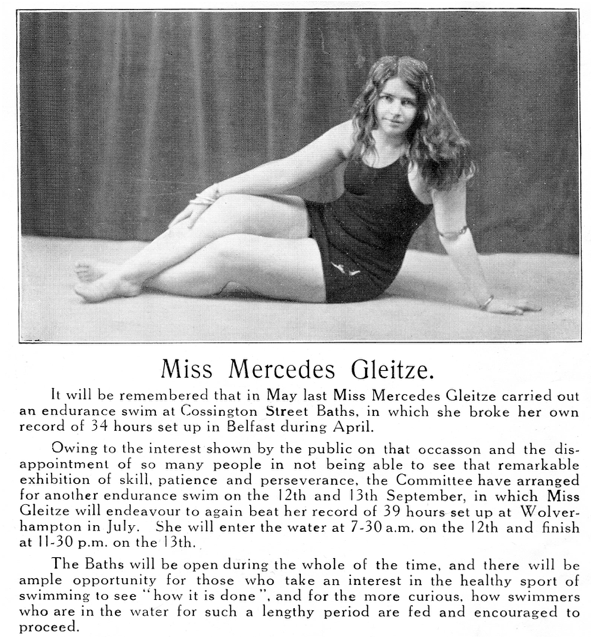Leicester (40 hours) – 12 to13 September 1930
Belgrave Baths, Cossington Street
Intervention by the Amateur Swimming Association (ASA): It was at this stage in Mercedes’s strategy to gradually raise the British record for endurance swimming that the ASA – some of whose members had previously acted as volunteer officials and observers at her endurance swims – announced that, because she was a paid professional swimmer, they could no longer sanction their involvement. It is clear that in the eyes of the ASA the line between amateur and professional had been crossed, and from then on helpers were enlisted from other willing local groups.
Second time around: An invitation to give a repeat performance in Leicester had been extended to Mercedes by Mr E. Hobson, the Superintendent of the Belgrave Baths, after her first endurance swim in that city in May. Major refurbishment works to the Belgrave Baths in Cossington Street were to continue throughout the summer, and so her next swim was booked for the second week of September, coinciding with the official re-opening of the pool.
Page from a booklet dated 11 September 1930 produced by Leicester Corporation in connection with the reopening of the Belgrave Baths in Cossington Street, Leicester.

Mr Hobson had travelled to watch Mercedes swim in Sheffield earlier that year, and he kept up regular correspondence with her during the summer months in order to secure a new contract. She had already asked the Deputy Town Clerk in Douglas to send Mr Hobson the Douglas log for guidance, and asked him to keep the document safe until her arrival.
Mercedes arrived back in Dover from Turkey on 9 September, and travelled the next day to Leicester to prepare for the return visit. She entered the water at 7.30 a.m. on 12 September and at 11.30 p.m. on 13 September she was taken out of the baths after swimming continuously for 40 hours. The swim was again attended by large numbers of spectators, but unfortunately the total number is not recorded in covering media reports.
She told the Mercury
representative that she felt better than after previous swims in spite of exceeding her own longest effort by one hour. “I could have gone on” she said, her body having gradually adapted to this new physical routine she was demanding of it. She had enjoyed an uninterrupted sleep from the moment she was put to bed until the early morning, whereas on previous swims she generally woke up two or three times and sometimes found it difficult to go to sleep again.
The following day Mercedes attended the Mercury
newspaper’s stand at the Leicester Home Life Exhibition, where crowds of women visitors congratulated her on her swim. A few days later she was on her way to Scotland, where the people in Dundee turned out in record-breaking numbers to cheer her on during her next endurance swim.